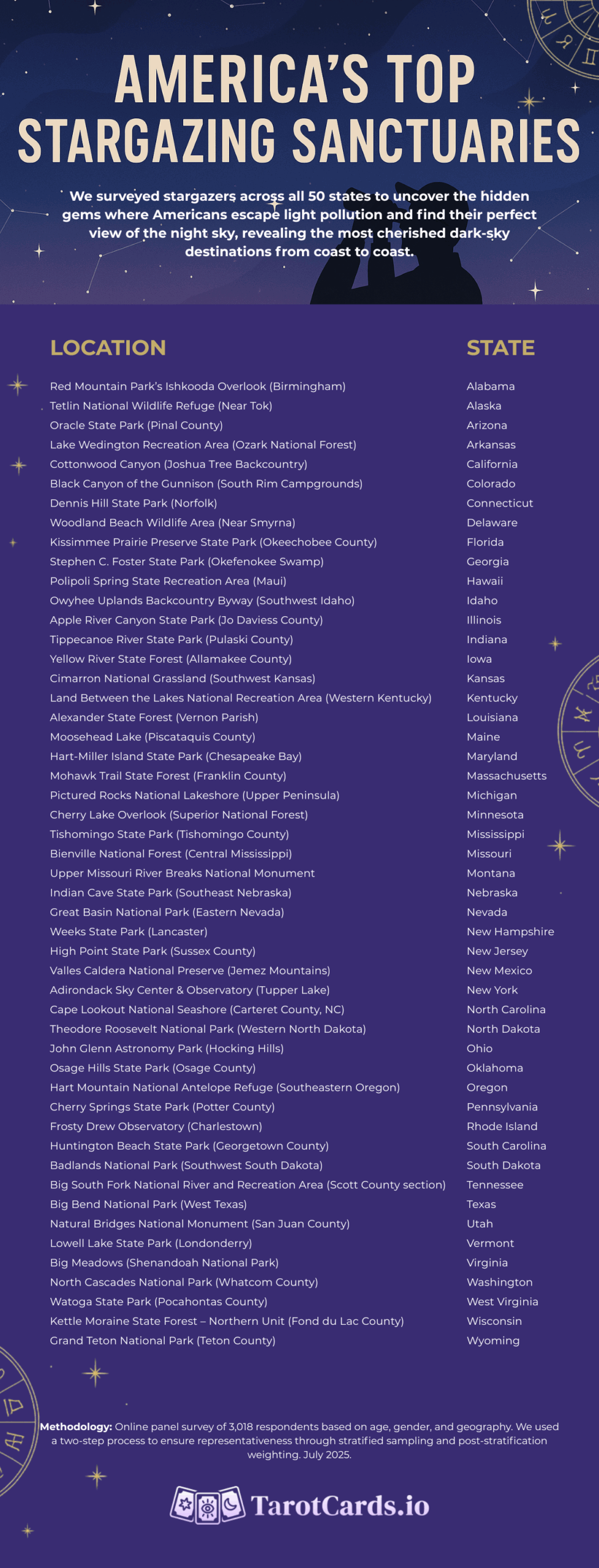Top 145 Best Places to Stargaze in the U.S. [2025 Survey]
Table of Contents
When it comes to travel, most people can rattle off the must-see landmarks in their state – the best hikes, the famous viewpoints, the iconic photo ops. But what about the best places to simply look up?
We surveyed over 3,000 avid campers and outdoor lovers across the U.S. to find the most beloved local spots for stargazing – the quiet corners where the night sky truly comes alive.

Looking for clarity or guidance?
Start a free AI psychic chat in a safe, supportive space. Ask unlimited questions and receive instant insights tailored to you. Your journey is unique—get the answers you need.
Learn MoreBeyond just naming locations, the results revealed patterns in how and where Americans connect with the cosmos.

Key Findings
Some states just can’t pick one.
Hawaii, Wyoming, Montana, Arizona, Texas, Florida, California, New Mexico, and a few others each had multiple stargazing hotspots mentioned, suggesting their residents couldn’t agree on just one ideal place.
It’s a sign of sky-rich terrain and passionate local campers who all have their personal “perfect” view of the stars.
The Mountain West shines brightest.
States like Utah, Colorado, and Wyoming appeared repeatedly, thanks to their combination of elevation, dry air, and minimal light pollution.
These spots aren’t just popular for stars – they’re ideal for spiritual retreats and digital detoxes too.
Dark sky love in unexpected places.
Delaware, Rhode Island, and New Jersey might not be known for vast wilderness, but each still has its stargazing loyalists.
Parks like Trap Pond and Frosty Drew Observatory show that even small coastal states can have strong ties to the stars – if you know where to look.
East Coast states leaned observatory-friendly.
Many Northeastern entries (like Cherry Springs in PA or Weeks State Park in NH) had official observatories or designated dark sky zones.
There’s a pattern here: more densely populated areas seem to favor curated experiences, while wide-open western states go for pure, off-the-grid views.
Waterfront views made a cosmic splash
From Maine’s Katahdin Woods to Michigan’s Pictured Rocks and California’s Indian Valley Reservoir, locations near lakes, rivers, or coastlines were common picks.
Stargazing beside water seems to tap into something deeply calming – perhaps the twin awe of stars above and reflections below.
The South shows stargazing pride.
Tennessee, Kentucky, Alabama, Georgia, and South Carolina all had well-loved night-sky destinations, often tied to national forests or lesser-known preserves.
Stargazing here often pairs with storytelling, hiking, and a distinct sense of cultural place.
Cosmic tourism meets cultural heritage.
Places like Mauna Kea Access Road in Hawaii or Chiricahua National Monument in Arizona blend Indigenous history, geological wonder, and astronomy.
These stargazing destinations offer more than just a view – they connect to deeper cultural narratives.
Final Thoughts
This wasn’t just a ranking of dark skies – it was a window into how different communities connect with the cosmos.
Whether it’s through rugged camping in a Utah canyon or quiet reflection on a New England mountaintop, the stars above remain one of the few constants that unite us across state lines.
And if there’s one thing our survey makes clear, it’s that stargazing isn’t just about seeing – it’s about feeling.
Methodology
Online panel survey of 3,018 respondents based on age, gender, and geography. Internal data sources are used to obtain population data sets. We used a two-step process to ensure representativeness through stratified sampling and post-stratification weighting.
Respondents are carefully chosen from a geographically representative online panel of double opt-in members. This selection is further tailored to meet the precise criteria required for each unique survey. Throughout the survey, we design questions to carefully screen and authenticate respondents, guaranteeing the alignment of the survey with the ideal participants.
To ensure the integrity of our data collection, we employ an array of data quality methods. Alongside conventional measures like digital fingerprinting, bot checks, geo-verification, and speeding detection, etc. each response undergoes a thorough review by a dedicated team member to ensure quality and contextual accuracy. Our commitment extends to open-ended responses, subjecting them to scrutiny for gibberish answers and plagiarism detection.
Curious about what lies ahead?
Get a free AI tarot reading and explore guidance designed just for you. Discover the messages the cards have to share and gain insight into your path.
Learn More





